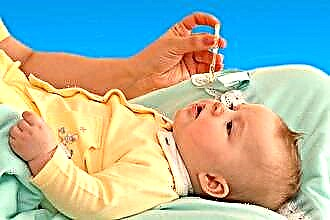Treating chronic tonsillitis is a tricky business. Some people try to get rid of the disease by taking a large number of different medicines and resorting to different methods, both traditional and traditional medicine. However, in order to really forget about this disease for a long time, antibacterial drugs are needed.
Antibiotics for chronic tonsillitis should be used only when other means and methods are not able to stop the development of inflammation. If the temperature rises and symptoms of intoxication appear, the use of antibiotics is absolutely justified. After all, the benefits from them will be much greater than the risk of side effects. What drugs can be taken for chronic tonsillitis and how should it be done?
How to choose a general-purpose drug
 If the doctor diagnosed chronic tonsillitis and you can't get away from antibiotic treatment, you need to find the most effective medicine. The chosen medication should easily seep into the soft tissues of the body. After all, its active substances must be guaranteed to get to the tonsils themselves and into the nasopharynx, captured, for example, by staphylococcus. In addition, the drug should be capable of continuous concentration in places especially in need of assistance. This is necessary in order to reduce the number of tablets (capsules, suspensions) taken. As you know, there are no absolutely harmless drugs. Therefore, the fewer pills you need to recover, the better.
If the doctor diagnosed chronic tonsillitis and you can't get away from antibiotic treatment, you need to find the most effective medicine. The chosen medication should easily seep into the soft tissues of the body. After all, its active substances must be guaranteed to get to the tonsils themselves and into the nasopharynx, captured, for example, by staphylococcus. In addition, the drug should be capable of continuous concentration in places especially in need of assistance. This is necessary in order to reduce the number of tablets (capsules, suspensions) taken. As you know, there are no absolutely harmless drugs. Therefore, the fewer pills you need to recover, the better.
Today, only modern antibacterial drugs meet all of these requirements. Most of them quickly and effectively cope with exacerbations of chronic tonsillitis and eliminate unpleasant symptoms.
- Penicillins. Antibiotics of this particular category are most often used to treat chronic tonsillitis. With the help of "Amoxicillin", "Flemoxin", "Tikarcillin" and similar agents, it is possible to treat exacerbated angina in both adults and children. The difference will only be in the dosage. These medicines are relatively inexpensive and of very high quality. For example, a characteristic feature of "Amoxicillin" is its rapid absorption in the intestine. This speaks of its excellent digestibility. Only a doctor is involved in the selection of an individual dosage of the drug, taking into account all the nuances. As a rule, adults and children over 10 years old need to take this drug three times a day, 0.5 g each.
- Persistent penicillins. If you need to eliminate the symptoms of chronic tonsillitis in the shortest possible time and with an anti-relapse guarantee, you should pay attention to the so-called persistent penicillins. This is an improved variety that perfectly fights against the harmful effects of microorganism enzymes. Among these drugs, the most popular are "Amoxiclav", "Flemoklav", "Sultamicillin" and the like.
 Macrolides ("Clarithromycin", "Sumamed" and "Azitral"), as well as cephalosporins ("Ceftibuten", "Cefepim", "Ceftazidime" and "Cefadroxil") are not inferior to penicillins in efficiency. They act quickly enough. Literally an hour and a half after taking the first pill, the condition improves significantly. Due to the very slow elimination of these drugs from the body, it is permissible to take them only once a day.
Macrolides ("Clarithromycin", "Sumamed" and "Azitral"), as well as cephalosporins ("Ceftibuten", "Cefepim", "Ceftazidime" and "Cefadroxil") are not inferior to penicillins in efficiency. They act quickly enough. Literally an hour and a half after taking the first pill, the condition improves significantly. Due to the very slow elimination of these drugs from the body, it is permissible to take them only once a day.- Aminoglycosides. If Staphylococcus aureus is guilty of chronic tonsillitis, drugs from the aminoglycoside category should be used against it. Amikacin has proven itself well. It has no side effects from which the kidneys suffer. You can also use "Zanoacin", "Loxon", "Lomacin" and similar drugs.
As a rule, after a person has started antibiotic treatment for tonsillitis, his condition is relieved by 2 or 3 days. If 3 days have already passed, and there is no tangible effect, it is imperative to notify the doctor about this. Apparently, the medication being taken is not suitable, which means that you should choose a drug from a different category.
Local therapy
To speed up the onset of recovery, general antibiotics will not be enough. There is a need for additional intake of local antibacterial drugs. The methods of such therapy are represented by rinsing the throat with medicinal solutions, inhalation and lubrication of the tonsils with special compounds.
 One of the most effective methods of local antibiotic therapy is to flush the inflamed lacunae with a solution of some sulfonamide or penicillin. The duration of the course of such procedures is from 7 to 10 days. Moreover, the gaps should be washed every day. A syringe is required for high-quality washing.
One of the most effective methods of local antibiotic therapy is to flush the inflamed lacunae with a solution of some sulfonamide or penicillin. The duration of the course of such procedures is from 7 to 10 days. Moreover, the gaps should be washed every day. A syringe is required for high-quality washing.- With an exacerbation of chronic tonsillitis, antibacterial drugs can be administered by the intratonsillar or paratonsillar method (administration of the drug directly into the palatine tonsils). This is a great alternative to flushing if the abscesses are too deep and difficult to reach. Often, antibiotics from the penicillin category are used to perform these procedures.
- The condition of the tonsils in chronic tonsillitis is positively affected by inhalation and irrigation of the pharynx with the help of antibacterial drugs. Angina in adults is treated with Bioparox, Ambazon, Stopangin and Grammidin.
How to treat chronic tonsillitis in pregnant women
It is not recommended to treat exacerbated chronic tonsillitis with antibacterial drugs during pregnancy. And in the first trimester it is strictly prohibited. However, the complete absence of any treatment in such a condition is no less dangerous for both the woman herself and the fetus. Any infection that a pregnant woman has suffered during a period when vital organs are being laid in a child can disrupt their development and lead to all sorts of pathologies.
 Fortunately, today there are medicines to effectively combat exacerbated chronic tonsillitis, which are acceptable to take during pregnancy. The safest antibacterial drug is Flemoxin. Its main advantage is that it is quickly absorbed by the walls of the stomach and just as quickly leaves the body. However, the effectiveness of the remedy does not decrease from this. Due to the high rate of elimination of this drug from the body, it does not harm the fetus.
Fortunately, today there are medicines to effectively combat exacerbated chronic tonsillitis, which are acceptable to take during pregnancy. The safest antibacterial drug is Flemoxin. Its main advantage is that it is quickly absorbed by the walls of the stomach and just as quickly leaves the body. However, the effectiveness of the remedy does not decrease from this. Due to the high rate of elimination of this drug from the body, it does not harm the fetus.
Women awaiting the birth of a baby can also treat chronic tonsillitis with Amoxicar, Amoxon, Danemox, Klavunat or Medoklav. The listed medicines should be taken for at least 14 days. Otherwise, the treatment will be ineffective.
After completing the therapeutic course, a pregnant woman should definitely pass a bacteriological analysis. This is necessary to confirm recovery.
How to take antibiotics
To get the expected effect of taking antibacterial drugs for chronic tonsillitis, you need to adhere to several rules. It is highly undesirable to be self-appointed. Even a minimal deviation from the instructions can lead to the development of side effects or lack of result. Let's list the main recommendations:
 It is necessary to strictly follow the dosage and intervals for taking the medication, which are indicated in the attached instructions. If the doctor made appointments that differ from what is written in the instructions, you need to follow his recommendations.After all, the doctor knows your body better. Each medication has its own schedule of admission, which must be followed. Some medications should be drunk before meals, while others - on the contrary, after it.
It is necessary to strictly follow the dosage and intervals for taking the medication, which are indicated in the attached instructions. If the doctor made appointments that differ from what is written in the instructions, you need to follow his recommendations.After all, the doctor knows your body better. Each medication has its own schedule of admission, which must be followed. Some medications should be drunk before meals, while others - on the contrary, after it.- To take a pill or capsule, you must use extremely pure plain water. It is strictly forbidden to drink antibiotics with milk, any fermented milk product, as well as coffee or tea.
- It is strictly forbidden to make adjustments to the dosage or to arbitrarily stop taking the medicine. This can adversely affect overall health and delay recovery.
- In parallel with the antibiotic, it is imperative to take a probiotic. After all, even the best antibacterial drug used for tonsillitis has a negative effect on the internal intestinal microflora. Taking probiotics will help restore the imbalanced microflora.
- In no case should you prescribe antibiotics yourself and go through them one by one if the previous one did not fit. Such funds should be prescribed only by a doctor after examination and collection of anamnesis.
Why antibacterial agents are not a panacea
Microbes enter the body almost every minute. Chronic tonsillitis occurs not so much due to direct infection as due to an insufficient response of the immune system. Therefore, as soon as remission is established, it is advisable to strengthen the immune system in every possible way so that the body itself can effectively fight bacteria.
 Harmful microorganisms have been confronted with antibacterial drugs for several decades. As a result, they became resistant to them and developed enzymes that destroy the active substances of drugs. Thus, each new course of treatment helps microbes to acquire resistance not only to a specific drug, but also to a whole category of similar drugs.
Harmful microorganisms have been confronted with antibacterial drugs for several decades. As a result, they became resistant to them and developed enzymes that destroy the active substances of drugs. Thus, each new course of treatment helps microbes to acquire resistance not only to a specific drug, but also to a whole category of similar drugs.
There are so-called bactericidal drugs. They are equated to antibiotics, as they also eliminate harmful bacteria. However, in reality, they only suppress their growth and reduce their number. These medicines cannot completely eliminate microorganisms.
Often, bacteriological analysis is not carried out and one of the antibiotics with a wide range of effects is immediately prescribed. In some cases, such treatment is ineffective. There is a need for a repeated therapeutic course.
Post factum
 It should be noted that during stable remission, there is no need to treat chronic tonsillitis with antibacterial drugs. Taking such serious medications in this case is completely inappropriate. If you continue to take the antibiotic during periods of "rest", so to speak, for prophylaxis, you can cause significant harm to the body. After all, he will be artificially weakened. Having become accustomed to the regular intake of a certain medication, he will no longer react as expected, at the moment when all forces will have to be mobilized for protection.
It should be noted that during stable remission, there is no need to treat chronic tonsillitis with antibacterial drugs. Taking such serious medications in this case is completely inappropriate. If you continue to take the antibiotic during periods of "rest", so to speak, for prophylaxis, you can cause significant harm to the body. After all, he will be artificially weakened. Having become accustomed to the regular intake of a certain medication, he will no longer react as expected, at the moment when all forces will have to be mobilized for protection.
Antibiotics for exacerbations are an effective and reliable way to relieve unpleasant symptoms. They should be chosen in accordance with the prescriptions of the attending physician and strictly follow the rules of admission. Then the manifestations of sore throat will quickly disappear.

 Macrolides ("Clarithromycin", "Sumamed" and "Azitral"), as well as cephalosporins ("Ceftibuten", "Cefepim", "Ceftazidime" and "Cefadroxil") are not inferior to penicillins in efficiency. They act quickly enough. Literally an hour and a half after taking the first pill, the condition improves significantly. Due to the very slow elimination of these drugs from the body, it is permissible to take them only once a day.
Macrolides ("Clarithromycin", "Sumamed" and "Azitral"), as well as cephalosporins ("Ceftibuten", "Cefepim", "Ceftazidime" and "Cefadroxil") are not inferior to penicillins in efficiency. They act quickly enough. Literally an hour and a half after taking the first pill, the condition improves significantly. Due to the very slow elimination of these drugs from the body, it is permissible to take them only once a day. One of the most effective methods of local antibiotic therapy is to flush the inflamed lacunae with a solution of some sulfonamide or penicillin. The duration of the course of such procedures is from 7 to 10 days. Moreover, the gaps should be washed every day. A syringe is required for high-quality washing.
One of the most effective methods of local antibiotic therapy is to flush the inflamed lacunae with a solution of some sulfonamide or penicillin. The duration of the course of such procedures is from 7 to 10 days. Moreover, the gaps should be washed every day. A syringe is required for high-quality washing. It is necessary to strictly follow the dosage and intervals for taking the medication, which are indicated in the attached instructions. If the doctor made appointments that differ from what is written in the instructions, you need to follow his recommendations.After all, the doctor knows your body better. Each medication has its own schedule of admission, which must be followed. Some medications should be drunk before meals, while others - on the contrary, after it.
It is necessary to strictly follow the dosage and intervals for taking the medication, which are indicated in the attached instructions. If the doctor made appointments that differ from what is written in the instructions, you need to follow his recommendations.After all, the doctor knows your body better. Each medication has its own schedule of admission, which must be followed. Some medications should be drunk before meals, while others - on the contrary, after it.

